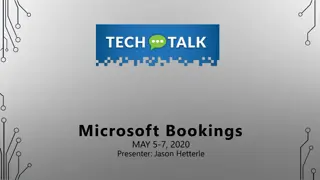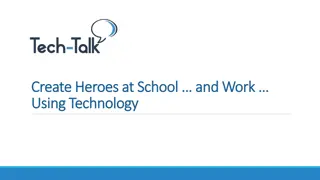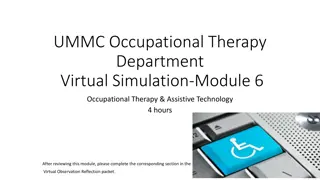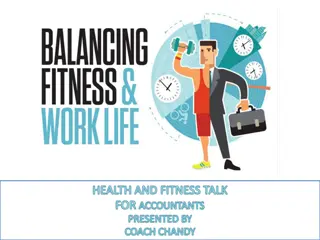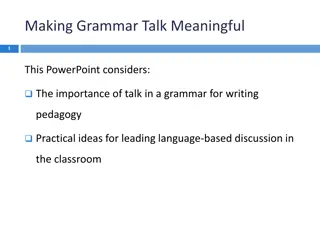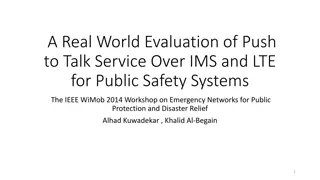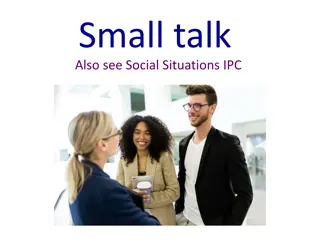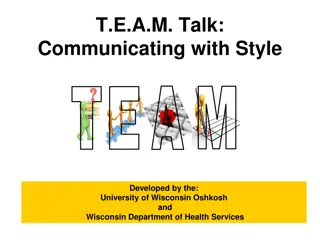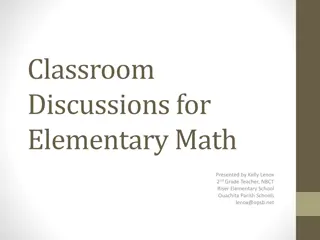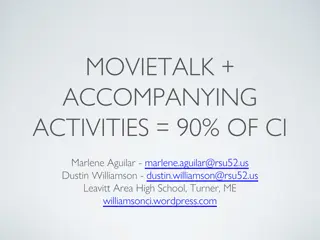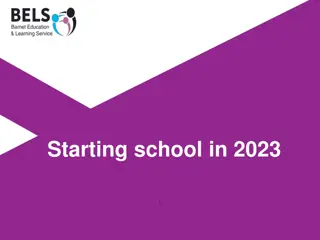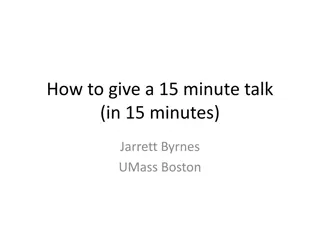Talk About:
Online learning presents unique challenges such as adjusting to different time zones, communicating effectively with professors, and staying motivated in asynchronous courses. To address these challenges, implementing a 24-hour time grid for scheduling study, sleep, meals, and free time is key. Strategies like email etiquette and virtual office hours can help bridge the gap with professors. Additionally, setting specific study times, using chunking techniques, and following a structured weekly study plan can boost motivation in asynchronous courses. Stay organized and proactive to excel in your online learning journey.
Download Presentation

Please find below an Image/Link to download the presentation.
The content on the website is provided AS IS for your information and personal use only. It may not be sold, licensed, or shared on other websites without obtaining consent from the author.If you encounter any issues during the download, it is possible that the publisher has removed the file from their server.
You are allowed to download the files provided on this website for personal or commercial use, subject to the condition that they are used lawfully. All files are the property of their respective owners.
The content on the website is provided AS IS for your information and personal use only. It may not be sold, licensed, or shared on other websites without obtaining consent from the author.
E N D
Presentation Transcript
Talk About: Best Practices for LfA
Challenges: Time Zones Challenges: Time Zones Adjusting to the differences in time zones
Best Practices: Best Practices: Create a Create a 24 24- -Hour Hour Time Grid Time Grid
How to Create Your Grid How to Create Your Grid Classes Sleep Meals and exercise Study time Free time
Boston Boston
Boston + Boston + 12 Hours 12 Hours
Challenges: Challenges: Communicating with Professors Communicating with Professors Feeling disconnected from professors Can t attend office hours
First class Best Practices: Best Practices: Communicating Communicating with Professors with Professors Email etiquette Email etiquette Virtual office hours and meetings
Challenges: Asynchronous Courses Challenges: Asynchronous Courses Lack of motivation Falling behind
Best Practices: Best Practices: Asynchronous Asynchronous Courses Courses Specific times Tips to increase motivation Chunking
CLASS BIOLOGY Assignments Watch Asynchronous Lectures Read Chapter 13 (pages 150-185) Sunday Read pages 150-160, take notes Monday Watch lecture & take notes: 2-2:30pm, 3-3:30pm Read pages 161-166, take notes Weekly Study Plan Tuesday Watch lecture & take notes: 7-7:30pm, 8-8:30pm Read pages 167-172, take notes Wednesday Watch lecture & take notes: 2-2:30pm, 3-3:30pm Read pages 173-178 Thursday Watch lecture & take notes: 7-7:30pm, 8-8:30pm Read pages 179-185 Friday Review notes from lecture & textbook
Challenges: Challenges: Connecting to the Community Connecting to the Community Disconnected from classmates Disconnected from broader BU community
Best Practices: Best Practices: Connecting to the Community Connecting to the Community Discussion forums Zoom: chat & breakout rooms Slack Study group + accountability partner Casual social interactions Get involved Slack Review | PCMag
Looking for a Place to Looking for a Place to Study or Attend Class Study or Attend Class Remotely on Campus? Remotely on Campus? STUDY SPACE APP: STUDY SPACE APP: BU.EDU/STUDYSPACE
Academic Skills Advising Language Link Peer Tutoring Workshops Writing Assistance Services offered remotely via Zoom bu.edu/erc @BU_ERC @BUERC @BUERC
Best Practices: Breakout Rooms Best Practices: Breakout Rooms Introduce yourself: Name Program and year
Best Practices and Advice from IPM s
Questions & Answers in Chat
Additional Resources Behavioral Medicine Sleep Hygiene Behavioral Medicine Sleep Resources Blackboard Learn Videos for Students BU Information Services & Technology Headspace
References Amenabar, T. (2020, Sept. 6). How college students can make the most of remote learning. The Washington Post. Retrieved from https://www.washingtonpost.com/education/2020/09/06/remote-learning-college-zoom/ Ariga, A. & Lleras, A. (2011). Brief and rare mental breaks keep you focused: Deactivation and reactivation of task goals preempt vigilance decrements. Cognition, 118 (3), 439-443. doi.org/10.1016/j.cognition.2010.12.007. Armstrong (2017, August 14). The roles of glucose in the brain. Retrieved from https://healthfully.com/358622-the-roles-of-glucose-in-the-brain.html Berman, M. G., Jonides, J., & Kaplan, S. (2008). The cognitive benefits of interacting with nature. Psychological Science, 19, 1207 1212. doi:10.1111/j.1467-9280.2008.02225.x Bouranova, A. (2020, Oct. 13). Life for international students? Fear. And resilience. BU Today. Retrieved from https://www.bu.edu/articles/2020/life-for-international-students- fear-resilience/ Cussler, S. & Gosselink, K. Learning Strategies. Academic Continuity, Mar. 2020, academiccontinuity.yale.edu/students/learning-strategies. Diekelmann, S., & Born, J. (2010). The memory function of sleep. Nature Reviews Neuroscience, 11, 114 126. doi:10.1038/nrn2762 Doyle, T., & Zakrajesk, T. (2019). The new science of learning: How to learn in harmony with your brain. Second edition. Stylus Publishing. Friedman, J. (2015, June 15). Ways to bounce back after falling behind in an online course. U.S. News & World Report. Retrieved from: https://www.usnews.com/education/online-education/articles/2015/06/15/ways-to-bounce-back-after-falling-behind-in-an-online-course Goel, N., Rao, H., Durmer, J. S., & Dinges, D. F. (2009). Neurocognitive consequences of sleep deprivation. Seminars in Neurology, 29, 320 339. doi:10.1055/s-0029-1237117 George Washington University English for Academic Purposes. (2020). 10 tips for international students studying online at GW. Retrieved from https://eap.columbian.gwu.edu/sites/g/files/zaxdzs1941/f/10%20Tips%20for%20Online%20International%20Students_Summer%202020.pdf Laskowski, A. (2020, Oct. 16). Dealing with loneliness in college during a pandemic. BU Today. Retrieved from https://www.bu.edu/articles/2020/loneliness-in-college-during- pandemic/
References continued Jahnke, A. (2020, Oct. 13). Need to find a place to study or attend a class remotely while on campus? It just got easier. BU Today. Retrieved from http://www.bu.edu/articles/2020/new-student-study-app-reserve-safe-study- spaces/?utm_campaign=bu_today&utm_source=email_20201014_full&utm_medium=2_must_read_1&utm_content=student Masento, N. A., Golightly, M., Field, D. T., Butler, L. T., & van Reekum, C. M. (2014). Effects of hydration status on cognitive performance and mood. The British Journal of Nutrition, 111(10), 1841 1852. https://doi.org/10.1017/S0007114513004455 Oppezzo, M., & Schwartz, D. L. (2014). Give your ideas some legs: The positive effect of walking on creative thinking. Journal of Experimental Psychology: Learning, Memory, and Cognition, 4, 1142 1152. doi:10.1037/a0036577 Pilcher, J. J., & Walters, A. S. (1997). How sleep deprivation affects psychological variables related to college students cognitive performance. Journal of American College Health, 46, 121 126. doi:10.1080/07448489709595597 Rasch, B., & Born, J. (2013). About sleep s role in memory. Physiological Review, 93, 681 766. doi:10.1152/physrev.00032.2012 Rivera, J. (2020). 10 tips for success in online classes. Retrieved from: https://www.usf.edu/education/about-us/news/2020/tips-success-online-classes.aspx Scheiderer, J. (2020, Dec. 28). What s the difference between asynchronous and synchronous learning? Retrieved from: https://online.osu.edu/resources/learn/whats- difference-between-asynchronous-and-synchronous-learning Verleger, R., Rose, M., Wagner, U., Yordanova, J., & Kolev, V. (2013). Insights into sleep s role for insight: Studies with the number reduction task. Advances in Cognitive Psychology, 9, 160 172. doi:10.5709/acp-0143-8 Weidlich, J. & Bastiaens, T.J. (2019). Designing sociable online learning environments and enhancing social presence: An affordance enrichment approach. Computers & Education, 142. doi.org/10.1016/j.compedu.2019.103622 Yale Poorvu Center for Teaching and Learning. (2020, Nov. 17). 7 tips for online learning: How to excel as an online student. Retrieved from: https://poorvucenter.yale.edu/7- Tips-for-Online-Learning




